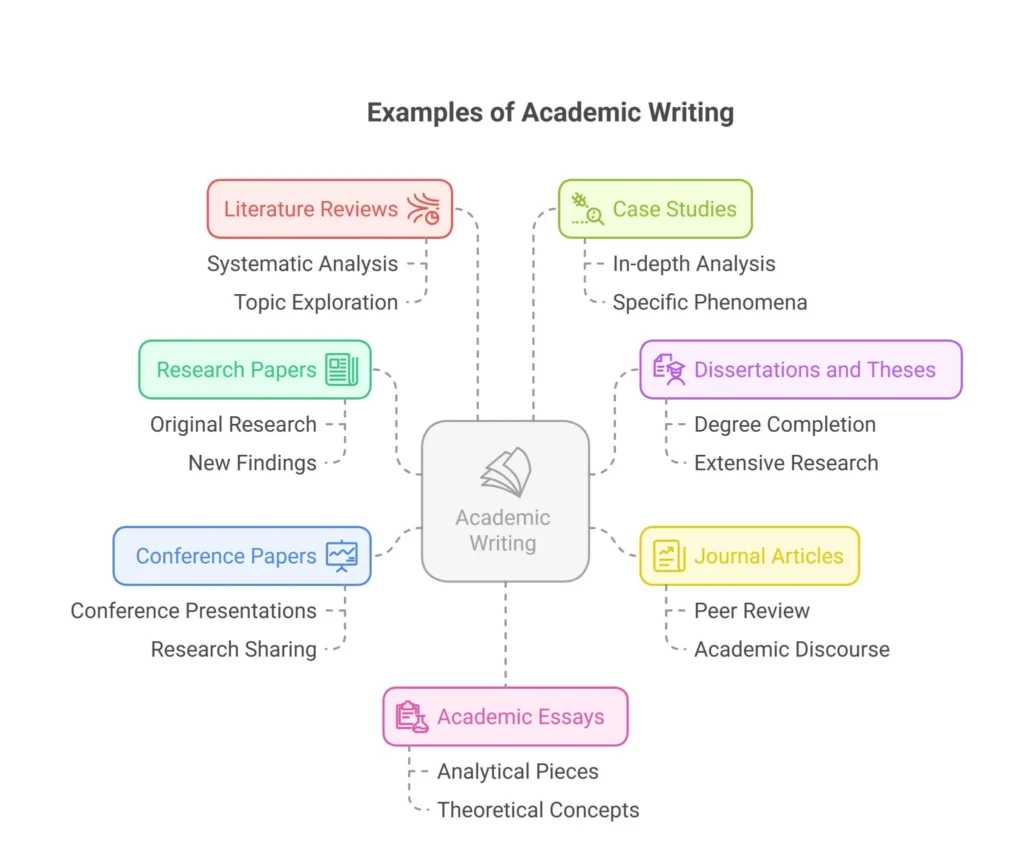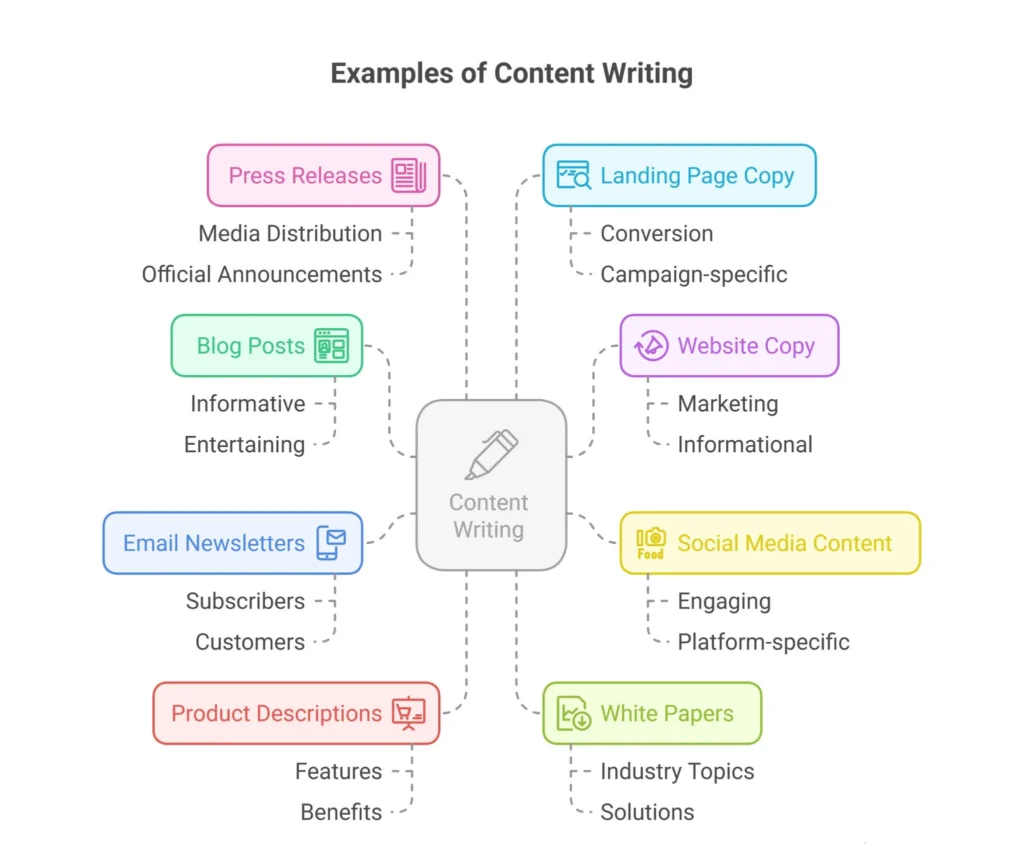Academic writing is formal, research-based writing for scholarly audiences that follows strict citation rules and contributes to academic knowledge. Content writing is engaging, SEO-optimized writing for general audiences designed to inform, entertain, or promote products and services online.
Understanding the difference between academic writing and content writing is crucial for students, researchers, and aspiring writers who want to excel in their chosen field. While both forms of writing require strong communication skills, they serve entirely different purposes and follow distinct conventions. Whether you’re transitioning from academic essays to web content or exploring career opportunities in writing, knowing these key differences will help you adapt your writing style effectively.
What is Academic Writing?
Academic writing is a formal style of writing used in educational and scholarly settings to convey scholarly information to a small group of qualified audiences. This type of writing is characterized by its methodical research approach, rigorous citation requirements, and objective tone. Academic writing includes research papers, dissertations, journal articles, and academic essays that contribute to knowledge within specific disciplines.
To understand it better, you can explore the types of academic writing which highlight different formats used in universities and research.
The primary purpose of academic writing is to present original research findings, analyze existing theories, or contribute to scholarly discourse. Academic writers must follow strict formatting guidelines and use proper citation for any data used in their work. This form of writing is often aimed at peers within the academic community who possess specialized knowledge in the subject area.
Key characteristics of academic writing include well-defined structure, extensive research backing, formal language, and adherence to specific style guides like APA, MLA, or Chicago. These are also considered the major features of academic writing that distinguish it from other forms of professional writing. The writing is generally objective, avoiding personal opinions unless supported by substantial evidence and methodical research to write academic content that meets scholarly standards.
What is Content Writing?
Content writing is a type of writing focused on creating engaging, informative, and persuasive material for digital platforms and marketing purposes. Unlike academic content writing, this form of writing is aimed at a broader target audience and is designed to rank better in search results while providing value to readers. Content writing involves creating articles on the web, blog posts, social media content, and marketing materials.
The purpose of content writing is to inform, engage, promote or entertain readers while often driving specific business objectives. Content writers must understand their target audience’s needs and create material that resonates with general readers rather than specialized academic audiences. This type of content may require images, graphics, and multimedia elements to enhance readability and user engagement.
Content writing encompasses various formats including web content, technical content, business writing, and general content writing. Each website has its own brand voice and style requirements, making adaptability a crucial skill for content writers. The writing style is typically conversational, accessible, and optimized for search engines and user experience.
The 7 Key Differences Between Academic Writing and Content Writing
The main difference between academic writing and content writing lies in their purpose, audience, and style:
| Aspect | Academic Writing | Content Writing |
|---|---|---|
| Purpose | Advance scholarly knowledge | Engage and inform general readers |
| Audience | Academic peers and researchers | General public and consumers |
| Tone | Formal and objective | Conversational and engaging |
| Structure | Rigid academic format | Flexible, SEO-friendly format |
| Citations | Mandatory formal citations | Optional or informal references |
| Length | Often 3,000+ words | Typically 500-2,000 words |
| Goals | Contribute to research | Drive traffic and conversions |
1. Purpose and Objective
Academic writing serves to advance knowledge within scholarly disciplines and contribute to academic discourse. The primary goal is to present research findings, analyze theories, or provide critical evaluation of existing scholarship. Academic papers aim to inform the academic community and establish the writer’s credibility within their field.
Content writing, conversely, focuses on engaging readers, building brand awareness, and often driving business objectives. The purpose of content writing extends beyond mere information sharing to include persuasion, entertainment, and audience engagement. Content writers create material designed to capture attention, solve problems, and encourage specific reader actions.
2. Target Audience Differences
Academic writing targets a small group of qualified audiences including researchers, professors, and students within specific academic fields. These readers possess specialized knowledge and expect rigorous analysis supported by comprehensive research. The academic audience values precision, objectivity, and adherence to scholarly conventions.
Content writing addresses a much broader and more diverse target audience. Content writers must consider various demographic factors, reading levels, and interests when crafting their material. The general audience for web content typically seeks quick, digestible information that solves immediate problems or answers specific questions.
3. Tone and Writing Style
Academic writing maintains a formal, objective tone that emphasizes credibility and scholarly authority. The writing is often dense with technical terminology and complex sentence structures. Personal opinions are generally avoided unless supported by substantial evidence, and the overall style prioritizes accuracy over entertainment.
Content writing adopts a conversational, accessible tone that connects with readers on a personal level. This style of writing emphasizes clarity, engagement, and readability. Content writers may include personal anecdotes, rhetorical questions, and varied sentence structures to maintain reader interest and improve the overall user experience.
4. Structure and Organization
Academic writing follows rigid structural conventions including abstract, introduction, methodology, results, discussion, and conclusion sections. Citations and references are mandatory, and writers must point to a reference for any claims made. The structure is well-defined and consistent across academic disciplines, with specific formatting requirements.
Content writing offers more flexible structure options depending on the platform and audience needs. While organization remains important, content writers can experiment with different formats, subheadings, and visual elements. The structure often prioritizes user experience and search engine optimization over academic conventions.
5. Research and Citation Requirements
Academic writing demands extensive research and requires important to use proper citation for any data or ideas borrowed from other sources. Writers must follow strict rules on how to cite sources and maintain detailed bibliographies. The research process is methodical and comprehensive, often involving primary sources and peer-reviewed materials.
Content writing may require research, but the citation standards are more relaxed. While factual accuracy remains important, content writers often use data and references more selectively and may not follow formal citation styles. The research focus tends toward practical, actionable information rather than theoretical analysis.
6. Language and Vocabulary
Academic writing employs specialized terminology and complex vocabulary appropriate for scholarly discourse. The language is precise and formal, often requiring readers to have background knowledge in the subject area. Academic writers prioritize accuracy and technical precision over accessibility.
Content writing uses accessible language designed for broader comprehension. Writers focus on clarity and readability, often explaining technical concepts in simple terms. The vocabulary choice depends on the target audience, but generally favors clear, direct communication over academic jargon.
7. Publication and Distribution
Academic writing is typically published in peer-reviewed journals, academic conferences, or institutional repositories. The publication process involves rigorous review by experts in the field. Distribution is often limited to academic databases and libraries, reaching primarily scholarly audiences.
Content writing is published across various digital platforms including websites, blogs, social media, and marketing channels. The distribution strategy focuses on reaching the widest possible audience and maximizing engagement. Content may be shared freely and designed to viral or generate significant traffic.
Examples of Academic Writing
Academic writing encompasses several distinct types, each serving specific scholarly purposes:
- Research Papers: Original studies presenting new findings to the academic community
- Dissertations and Theses: Comprehensive research projects for degree completion
- Journal Articles: Peer-reviewed publications contributing to academic discourse
- Conference Papers: Presentations of research findings at academic conferences
- Literature Reviews: Systematic analysis of existing research on specific topics
- Case Studies: In-depth analysis of specific phenomena or situations
- Academic Essays: Analytical pieces exploring theoretical concepts or arguments

These examples of academic writing share common characteristics including formal structure, extensive citations, objective tone, and focus on contributing to scholarly knowledge within specific disciplines. While writing these, students must also avoid common mistakes in academic writing.
Examples of Content Writing
Content writing includes diverse formats designed for different platforms and audiences:
- Blog Posts: Informative or entertaining articles for websites and platforms
- Website Copy: Marketing and informational content for business websites
- Social Media Content: Engaging posts for various social platforms
- Email Newsletters: Direct communication with subscribers and customers
- Product Descriptions: Marketing copy highlighting product features and benefits
- White Papers: In-depth reports on industry topics or solutions
- Press Releases: Official announcements for media distribution
- Landing Page Copy: Conversion-focused content for specific campaigns

These content writing examples demonstrate the variety and flexibility inherent in this form of writing, with each type serving specific business or communication objectives.
Are There Any Similarities?
Despite their differences, academic writing and content writing share several important similarities. Both require strong research skills, clear communication abilities, and attention to detail. Writers in both fields must understand their target audience and adapt their message accordingly. Additionally, both forms benefit from logical organization, compelling introductions, and strong conclusions.
Both academic and content writers must stay current with developments in their fields and maintain credibility through accurate, well-sourced information. Time management and deadline adherence are crucial in both contexts, whether meeting academic submission deadlines or content publication schedules.
The fundamental skill of translating complex ideas into coherent written form applies to both academic content writing and general content creation. Both require writers to engage critically with source material and present information in ways that serve their intended audience’s needs.
Skills Required for Each Writing Style
Academic Writing Skills
Academic writing requires specific competencies that differ significantly from other types of writing. Writers must master complex research methodologies and demonstrate ability to conduct methodical research to write academic content that meets scholarly standards. Critical thinking and analytical skills are essential for evaluating sources and constructing logical arguments.
Technical skills include proficiency with citation management systems, academic databases, and statistical analysis software. Academic writers must understand discipline-specific conventions and maintain objectivity while presenting research findings. The ability to write for peer review and handle constructive criticism is also crucial in the academic world.
Content Writing Skills
Content writing demands a different skill set focused on audience engagement and digital marketing principles. Writers must understand search engine optimization, keyword research, and content strategy development. Knowledge of various content management systems and basic HTML can be advantageous for web content creation.
Adaptability is crucial since content writers often work across multiple industries and formats. Understanding of analytics, conversion optimization, and user experience principles helps content writers create material that achieves business objectives. Social media literacy and multimedia integration skills are increasingly important in modern content creation.
Career Paths: Academic vs Content Writing
Academic Writing Career Opportunities
Academic writing careers typically follow traditional educational pathways within universities and research institutions. Opportunities include positions as research assistants, postdoctoral researchers, professors, and academic journal editors. The academic setting provides stable employment with benefits, though career progression can be highly competitive and slow.
Academic writers may also pursue careers in think tanks, government research agencies, or private research organizations. Grant writing represents another career avenue, combining academic research skills with practical funding applications. The academic community values long-term commitment and specialized expertise over broad market appeal.
Content Writing Career Prospects
Content writing offers diverse career opportunities across industries and employment types. Freelance content writers enjoy flexibility and variety, working with multiple clients across different sectors. In-house content writers can specialize in specific industries while building expertise in content strategy and brand development.
Career advancement in content writing can be rapid, with opportunities to move into content management, marketing strategy, or digital marketing leadership roles. The field offers good earning potential and the ability to work remotely, making it attractive to many modern professionals. Content writers can also transition into related fields like copywriting, social media management, or content marketing.
Which One Should You Choose?
Choosing between academic writing and content writing depends on your career goals, interests, and lifestyle preferences. Academic writing suits individuals who enjoy deep research, theoretical analysis, and contributing to scholarly knowledge. This path requires patience for long-term projects and comfort with the competitive academic environment.
Content writing appeals to those who prefer variety, faster-paced work, and direct audience engagement. This career path offers more immediate feedback and broader application across industries. Content writers often enjoy greater flexibility in work arrangements and potentially higher earning potential in the short term.
Consider your natural strengths when making this decision. If you excel at detailed research and formal analysis, academic writing may be your calling. If you’re skilled at making complex topics accessible and enjoy creative problem-solving, content writing might be the better choice. Many successful writers develop competencies in both areas, using academic writing skills to enhance their content credibility while applying content writing techniques to make academic work more engaging.
The choice between these writing styles isn’t necessarily permanent. Many professionals successfully transition between academic and content writing throughout their careers, leveraging skills from both disciplines to create unique value propositions in their chosen field. Understanding both approaches will make you a more versatile and effective writer regardless of your ultimate career direction.

